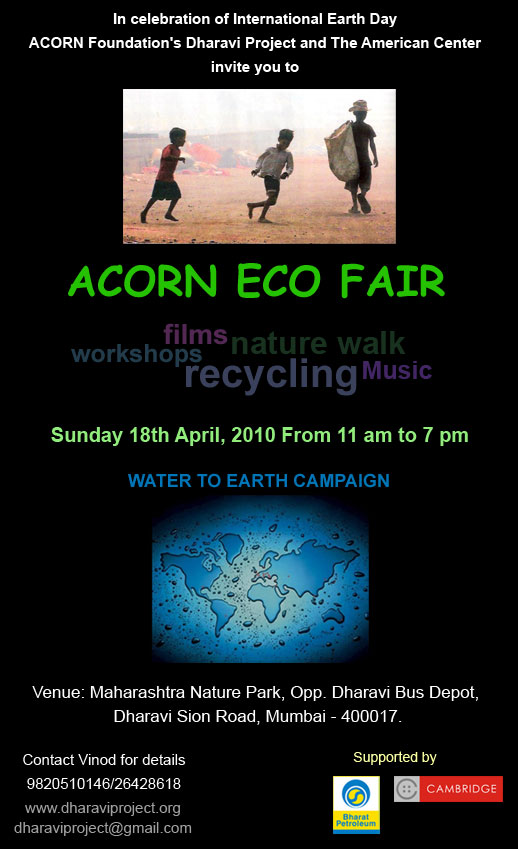Your cart is currently empty!
Category: ACORN India
ACORN India came into existence when in March 2005 the stage was set by the work ACORN International was doing in partnership with the FDI Watch campaign in India. ACORN India FDI Watch seeks to scrutinize and challenge Foreign Direct Investment in the retail sector in India. ACORN India seeks to prevent large multi-national companies like Wal-Mart from entering Indian markets unless they guarantee protection of communities they affect; ensure stability of the existing small businesses and ensure livelihoods of small traders; guarantee fair wages, just working conditions and a right to unionize to all their employees; and ensure that a significant portion of the supplies comes from the Indian markets. LEARN MORE>>>
-
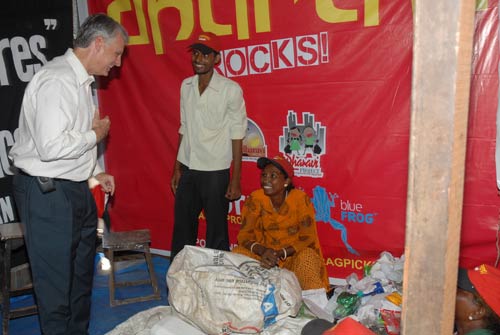
Visit from the US Ambassador to India, Timothy J. Roemer
The US Ambassador to India, Timothy J. Roemer, and his wife Sally, visited our ACORN India ‘Dharavi Project’ on May 11, 2010. The US consul general in Mumbai, Paul Flomsbee, who has previously visited the project, was also present. Roemer was interested in seeing how the Dharavi rag-picker community contributes to the ecological well-being of the city, and how the Dharavi Project enhances their livelihood.
Roemer was given an overview of the Dharavi Project’s mission and activities, and then provided a tour of the non-profit’s newly-commissioned office and waste segregation center, a paper recycling facility, and the massive waste collection area nearby. During the visit, Roemer personally interacted with rag-picker members and recyclers, as seen in the first picture below, and even played a quick round of cricket with rag-pickers kids while balancing on one of the massive pipelines leading out of the city. Two members of the rag-picker community, Rafique and Lakshmi, shown in the third picture below, described their work to Roemer. Finally, Roemer tried his hand at one of the paper recycling machines.
Roemer learned about how the Dharavi Project program in Mumbai organizes 400 or so rag-picker members, gives them identification, and runs relevant waste management and cultural programs with 30+ schools, artists and even some corporates. The Dharavi Project also works closely with the American School of Bombay on a ‘waste matters’ campaign that helps the school kids manage their waste and donate a portion of it to the rag-pickers. Roemer expressed his support for a similar program with the new US consulate facility in Bandra Kulra Complex.

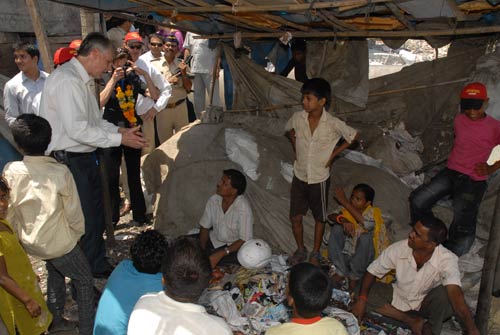
-
Giving ragpickers the fourth R
By: The Times of India
They comprise the 1,20,000-strong army that saves Mumbai from further environmental degradation. Yes, their livelihood is dependent on the 8,000 tonnes of waste that the megapolis spews out daily. But if it weren’t for their recovering, recycling and ensuring reuse of the waste (the three Rs of their difficult lives), this city would have been one big dumpyard.
Ragpickers’ working hours are spent in combing the city’s alleys, beaches, rubbish dumps and even diving into the foetid waters of mangrove swamps. Eventually they congregate at Dharavi, the world’s largest recycling unit where almost 80 per cent of dry waste is reused.
Now there’s an initiative afoot to bestow a fourth R on the ragpicker brigade—respect. The Acorn Foundation India Trust is set to organise these workers and train them in scientific methods of waste handling, segregation and recycling. “We want to highlight their work in protection of the environment,” says Vinod Shetty of the Acorn Foundation. “We want the government to set up a board whereby polluters pay a cess of about one per cent which can go towards giving these ragpickers a proper income with safe equipment like gloves and other amenities. We want them to be trained in how to handle toxic waste and expertise in recycling goods in a non-hazardous way.”
For a start, all members of the Dharavi Project are being given identity cards. They have formed their own committee which is involved in waste awareness programmes. In one programme, young ragpickers are partnering with schools in waste management. Currently there are some 350 members of the Dharavi Project.
The foundation has also undertaken another initiative— to organise health clinics, programmes and workshops from which young children engaged in ragpicking can get some kind of informal education in music, photography and other arts. A number of artistes have participated in such programmes, among them singers Shankar Mahadevan, Sunita Rao and Apache Indian and Katrina Kaif. “Nearly 40 per cent of those in the waste business are children and women,” says Shetty. “We do not want to support child labour but realise that this sector needs alternatives. We hope such cultural events will help them think differently.”
-
Garbage is not a dirty word
With the help of kids, Vinod Shetty is getting the city to show some respect to rag pickers, reports Kevin Lobo
Dharavi, Asia’s largest slum, is the last place you’d associate with environmental conservation. But as the world celebrates Earth Day today, Vinod Shetty, founder of NGO Acorn India, is out to prove how the rag pickers of Dharavi are one of the main cogs in the wheel for recycling the city’s daily output of 10,000 tons of waste. With the help of about 450 kids, a sizeable amountof whom are rag pickers, Vinod plans to change the perception of this city.
These kids will paint together, make paper bags together, and watch documentaries together. To add star value to the event, Shankar Mahadevan will lend some glitter. The highlight of the day will be the sight of kids from diametrically opposite backgrounds grooving together to music by Ankur Tewari and Something Relevant.
But change does not happen overnight. Vinod runs a waste management programme in 35 schools in the city. “The same kids who have been trained to think that the kachra dabba is dirty take pride in joining the waste management committee,” says Vinod.
The 40-something advocate has been running this programme for the past two years to educate kids about the plight of these green-collar workers. “We were trying to get the BMC to clean the waterfront at the Bandra Bandstand. One lazy evening at my house in Chimbai village, there was this group of people cleaning the place up for free. There was no media, no cameras around, just three to four rag pickers gathering up plastic,” says Vinod.
Facilitating a change of perception was the first thing that struck him. “When a person is living a corrupt life, you can’t tell them that they are corrupt and expect them to change. You have to change people before they become corrupt,” he explains. Kids were his natural target audience.
Though his school programmes have educated kids, both about rag pickers and the benefits of recycling waste, if perceptions have to change there is nothing better than face-to-face conversations. Thus came about the Earth Day event.
With Earth Day falling just after the school exams it has been difficult to get kids to attend the day-long programme. Vinod is also severely shortstaffed. With just one person on the pay roll Vinod depends heavily on volunteers to get things done. But over his 20-year ‘career’ in social work Vinod knows the drill.
A change in attitude is not all he is gunning for. Vinod does feel rotten that these kids don’t have a chance to go to school but feels that even that will change with perception. If there were systems in place, where garbage could be segregated into wet and dry waste, that would be a start. Money can be generated through recycled products which in turn could be used to establish schools.
“Since rag pickers don’t use the AC, nor drink mineral water, nor drive SUVs, the environmental problem is ours, not theirs. We are trying to create an interactive bond between the rag pickers and school students. I want to protect their livelihood. Instead of burning waste we can start taking things to recyclers, with rag pickers leading the way,” he says. -
Slums as self-confrontation
ACORN International focuses on organizing slumdwellers in India. The following essay by Ashi Nandi is an interesting discussion of the overall issues much on people’s minds in India as slum removal is a bitter, though often cosmetic, issue in advance of the 2010 Commonwealth Games in Delhi.
By Ashis Nandy
The attempt to free cities of slums will only make them invisible.
There is another way of looking at slums, which is not only more creative but also more compassionate and humanitarian. Slums are parts of the city that constantly reminds us of our moral and social obligations. They are reminders that another India exists. People loathe slums not just because of the poverty they display, not just because the slums embarrass them in front of foreign visitors, but also because the slums look to them like indicators of their backwardness and do not allow them to forget or deny the poverty and the exploitation on which their prosperity is built. They blow up Rs 40,000 for a dinner for four persons at a five-star hotel while people scavenge for food outside the hotel. The slums are reminders of the open wounds of a city. That reminder is painful. Many do not want such reminders to be there.
Many see slums as failed parts of cities. They are regarded as parts of a city that do not conform to ruling ideas of an ideal city held by people in other parts of the city.
There have been some changes in the way people have looked at slums ever since colonial cities emerged. At one time, slums were seen as a kind of an invisible city: a place where servants and the poor blue collar workers stayed and one did not have to care for them. The architect-activist Jai Sen had a term for this attitude: in an essay in the journalSeminar he called a slum an Unintended City. There was little or no genuine attempt to accept the poor and disadvantaged as part of the city’s future—to accept them as equal and integral citizens or to re-plan the city according to their needs—Sen wrote
I think things have changed in the three decades since Sen said this.
Slums are not just the unintended city. They are now regarded parts of the city that should not be visible. City authorities in Delhi and Mumbai are planning to cover up slums for the Commonwealth Games. They are an embarrassment, which foreign visitors to the city must not see. A slum is a part of the city that has no business to be there.
Then there is the political-economic perspective on slums: people with low earnings prefer to stay in slums because they are close to their places of work. So the rich and middle classes get their cheap labour—drivers, vegetable vendors, domestic helps—from the slums. This approach has a built-in contradiction. The upper and middle classes do not want to pay their domestic helps at First World rates, but they want slums eliminated as in some First World cities, or in Asian cities pretending to be First-World cities like Singapore and Hong Kong. They will not do what citizens of Singapore and Hong Kong have done to eliminate slums. In Singapore and Hong Kong, too, you have to pay through your nose to get a domestic help or a chauffeur.
Slums are not regarded as political issues in many countries. But that is not so in India. Here, elections still reflect some of our real issues. You are always afraid when you see slums: it reminds the middle class they are sitting on a volcano. The fact that our political system has not forgotten the slums makes the wealthy and the middle class nervous.
Such anxieties have cultural consequences. In fact, I would go to the extent of saying that in the West, the more interesting cities have slums. New York has slums; Houston does not, not at least visibly. Los Angeles does not have conspicuous slums, Washington has and it’s a more interesting city because of that. The contradictions of the city are in full display. A society’s creativity depends on the oscillation and dialogue between slums and the rest of the city.
New York is an intellectually rich city because it has many things that are going out of fashion in mainstream America, such as street life and street food, street graffiti, street-side artists and musicians. It also has crime, sleaze and drugs. The latter have an effect somewhat similar to that of the activities of the Naxalites or the Maoists: they remind the middle classes and rich sections of a large number of disposable people living at the margins of desperation. In New York, the capital of global capitalism, more than 40,000 homeless adults live in streets, subways, and under bridges and train tunnels of the city; and 25 per cent of all children live in families with incomes below the official poverty line. New York is New York because it has, to some extent, learnt to live with slums. Many other cities in the West have dismantled slums but not homelessness.
Slums highlight such contradictions. If you have disowned parts of yourself and built up an elaborate system of psychological defenses, the contradictions do not vanish. They remain and you feel you are always being held accountable, being accused—by yourself. Such contradictions sharpen creativity. They impinge on the writers, artists and thinkers. The finest Dalit poetry in India, for example, has come not from writers in rural India where the situation may be more oppressive for the Dalits or from Dalits who have made it, but from writers living at the margins of society. They have lived either in a slum or close to it
This is not an attempt to romanticize slums but to emphasize that the slums are often the only connection the urban middle class has with some of the grim realities of society. The well-known Bangladeshi economist Mohammad Yunus once said that the only time the country’s rich and the wealthy faced what the poor in the country’s villages had lived with for centuries was when floods came to Dhaka. Likewise, the slums create a certain awareness, which we can afford to ignore at great risk. If we remove slums, the only people in touch with that reality may well be the Naxals, the Gandhians and some of the much-maligned, politically-aware NGOs.
Town planners in many countries think slums can be replaced with low-cost housing. Low-cost housing has relevance but it is neither foolproof nor offers a long-term solution. Once you give people such houses some of them might sell them to developers for gentrification and, ultimately, the other city encroaches on such projects. People who had some protection in slums, at least had a roof on their heads, lose that protection. Low-cost housing might lead to American-style gentrification in our political economy, too.
Even by conservative estimates, one-fourth of India is poor. They cannot be ignored. In our political system, electoral pressures and vote banks matter. And empowerment can be a solution. It is working in the case of the Dalits. It can bring small reliefs such as better sanitation, cleaner water, minimal healthcare and more toilets. Even now, without such facilities, lots of people prefer to stay in slums; they try to make something beautiful out of whatever little they have. Human beings are a resilient species and many prefer to live in a place where such resilience is in full display. The well-known Hindi film director Manmohan Desai used to stay in a locality that could be classified as a glorified slum. So did Vinod Kambli, the famous cricketer. Harlem has even become fashionable; former President Clinton has an office there now. Slums are not infra-human.
Planning cannot eliminate slums. As long as there is large-scale deprivation, as long as our rulers, our media and our urban middle class believe that proletarianization is better than being a farmer, artisan or a tribal, there will be sizeable number of people who will be made available for blue-collar work in our cities. Such people will like to stay close to their places of work. If you upgrade or destroy one slum, others will come up in its place a few hundred feet away.
The recent attempts to free Indian cities of slums will merely make the slums less visible. This is not a new project. Sanjay Gandhi tried it. Jagmohan tried it. I don’t blame them any more in retrospect. The urge to make slums invisible is there in almost every unthinking Indian—not just in the powerful, the foolish and the heartless.
The desire to secure services from slums and yet not see them is one of the diseases of our times that is taking an epidemic form.
A sociologist and a clinical psychologist, Ashis Nandy is with the Centre for the Study of Developing Societies, Delhi
-
CNN interviews Vinod Shetty of Acorn India / COI
CNN Mallika Kapur looks at how India is trying to dispose waste.
-
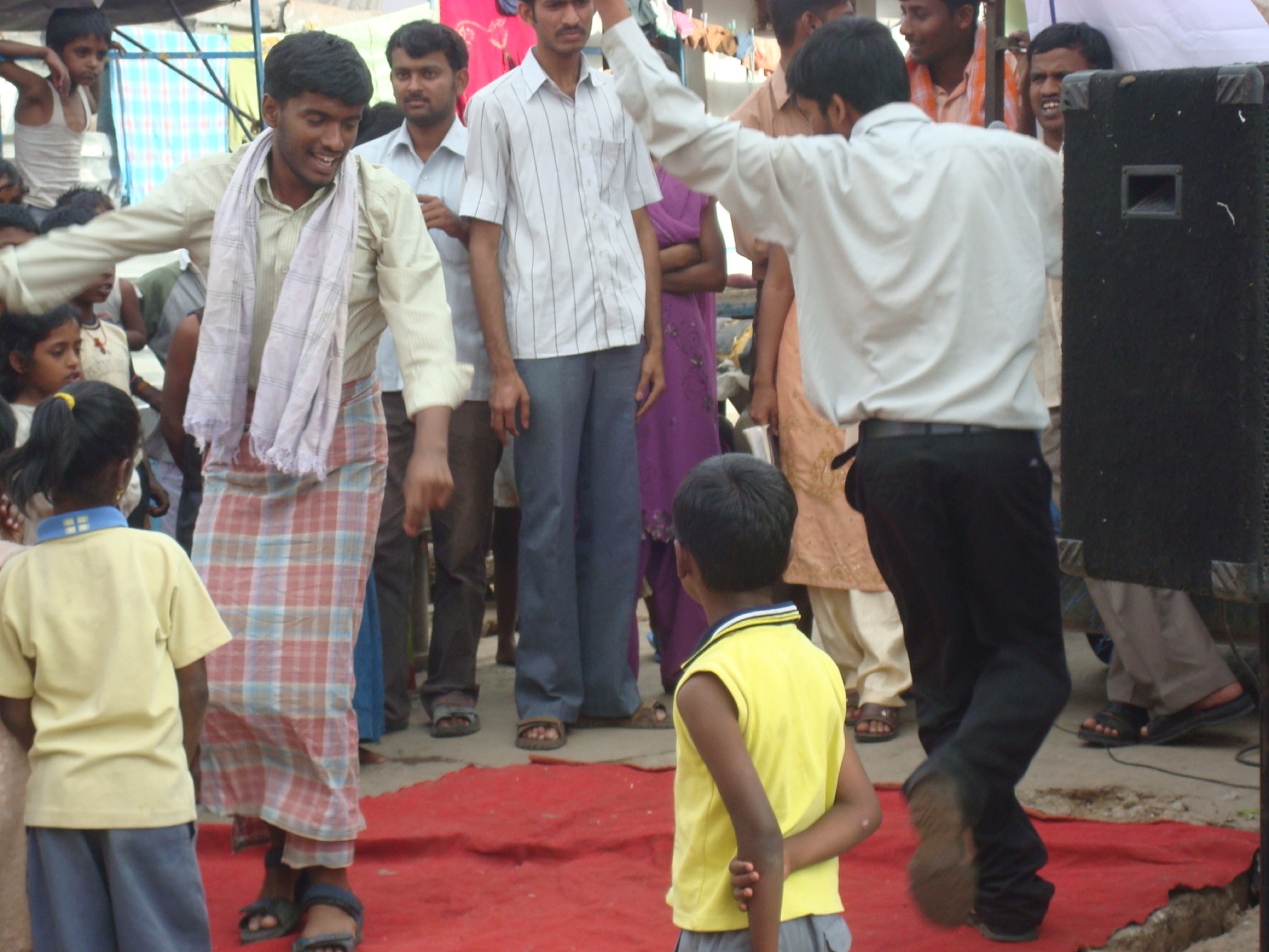
Right to Education for the Disabled
 ACORN India in Bangalore organized a Kalajatha (Street Play) to create awareness on
ACORN India in Bangalore organized a Kalajatha (Street Play) to create awareness on
right to education for the disabled in our working areas. The Kalajatha was organized by ACORN and supported by SN Basaveshwara Education Trust and the Acharya Institute of Management Studies. The Kalajatha was held in five slums of Bangalore where ACORN has members. The Kalajatha was held on 12th and 13th of March.On 12th the Kalajatha was held in Binnamangala and MV Garden. On 13th the Kalajatha was held in Lingarajapuram, Rajiv gandhi Colony and Devarjeevanahalli.
The Students of AIMS supported by acting in the plays and SN
Basaveshwara Education Trust supported by providing the sound system
and the vehicle was supported by the BBMP. -

Waste Matters
 On the 14th of January, 40 students and 4 teachers of the American school (ABS), Bandra Kurla Complex visited the Dharavi Project to meet our members and see the recycling Industry in Dharavi. The recyclers were struck by the age of these young environmentalists from the 5th grade who were participating in our “waste matters” project.The International school has children from all over the world studying with them. The 2 buses arrived at 11 am in Dharavi as part of the community and social responsibility project of the school. The Dharavi Project has been chosen as one of the NGO’s with which the ABS will be working this year. The 5th graders have already seen the documentary “Waste” and attended my talk last month on the work we are doing in Dharavi. I was asked many questions by these bright students during the talk, their young minds were delighted when I told them that they could visit Dharavi and see the recycling process which finally took place on the 14th .At every unit the students wanted to feel with their own hands the material being recycled, raising fresh questions, which our committee members gladly answered.After visiting the segregation , cardboard, footwear, plastic units, the students got back into their buses and went back to school.The students and teachers thanked our members for being such kind hosts and allowing the them to walk into their working spaces and educating them on the importance of recycling.
On the 14th of January, 40 students and 4 teachers of the American school (ABS), Bandra Kurla Complex visited the Dharavi Project to meet our members and see the recycling Industry in Dharavi. The recyclers were struck by the age of these young environmentalists from the 5th grade who were participating in our “waste matters” project.The International school has children from all over the world studying with them. The 2 buses arrived at 11 am in Dharavi as part of the community and social responsibility project of the school. The Dharavi Project has been chosen as one of the NGO’s with which the ABS will be working this year. The 5th graders have already seen the documentary “Waste” and attended my talk last month on the work we are doing in Dharavi. I was asked many questions by these bright students during the talk, their young minds were delighted when I told them that they could visit Dharavi and see the recycling process which finally took place on the 14th .At every unit the students wanted to feel with their own hands the material being recycled, raising fresh questions, which our committee members gladly answered.After visiting the segregation , cardboard, footwear, plastic units, the students got back into their buses and went back to school.The students and teachers thanked our members for being such kind hosts and allowing the them to walk into their working spaces and educating them on the importance of recycling. -
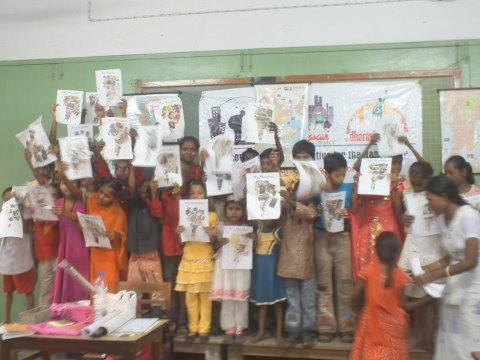
The Workshop

The Acorn Dharavi Project conducted a successful workshop for children of members living in the Rag pickers communities in Dharavi on 13th december, 2009. The workshop was conducted by a visiting volunteer Ekaterina Nikolova ( Katya) who used a mix of theatre, craft, games , physical activity, drawing , art and various other teaching techniques to make the children laugh, cry , shout ,learn and unlearn about their city and Dharavi.
The three hour workshop was attended by 35 students, and acorn committee members Anil, Vinod, Rafiq, Lakshmi, Sabya, Sangita, Kamble Moushi, and Fatima who assisted Katya. What is remarkable was that Katya was able to communicate with the children despite speaking very little Hindi, and the kids knew very little English.The workshop started with a introduction of all the kids to each other where they learnt their names, by shouting it out loud for all to hear, there itself the ice was broken when they all held hands and learnt their own names.This followed by a theatre session, where the children played various synchronised games i.e clapping, tom and Jerry, blind cat, Hawa chali and role reversal games. All these games were conducted in the open ground of the Xavier Institute where the workshop was conducted.The next session was the Art class which involved the children doing a collage of “My Mumbai” with waste paper, the children could not believe their eyes that they had made the collages themselves, their smiles say it all.This followed with a small lecture in English and hindi on global warming by Katya and Vinod, Recycling and the role of their parents in Rag picking and waste segregation. They also participated in a discussion on what problems that Dharavi was facing and the children came up with the burning issues i.e water, housing , electricity, schools, colleges, health etc,Finally the entire group participated in a group drawing of ” My life in Dharavi” , each group consisted of 5-6 children and they drew to their hearts content using crayons, and felt pens and plastic waste from segregation units in Dharavi which they were familiar with.The workshop ended with some impromptu dancing and singing and after a few snacks and drinks the students received their passing out gifts from Katya teacher, the kids said their goodbyes and headed back to Dharavi to their waiting mothers and fathers to report on their magical day at the acorn workshop , before leaving one small girl with crayon marks on her face asked when the next class would take place.

